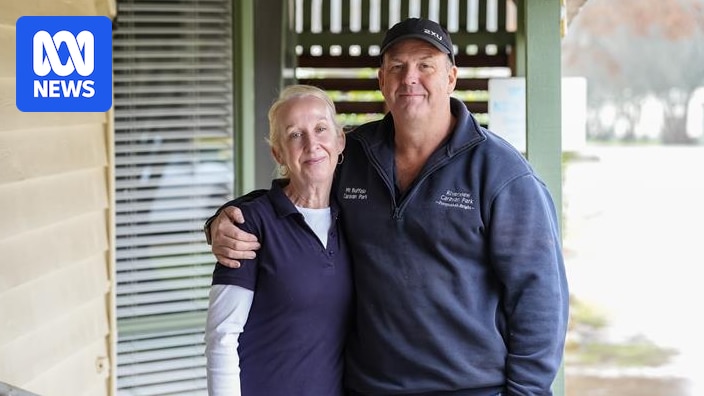
In the days following the tragic killing of two police officers, the residents of Porepunkah are grappling with grief and the fear that their town could be forever defined by the actions of a single individual. The small Alpine town, known for its tranquil winter charm, has been thrust into the national spotlight as a heavily armed fugitive remains on the run, prompting authorities to advise locals to stay indoors.
This unsettling atmosphere is a stark contrast to Porepunkah’s usual winter rhythm, where tourists flock to the slopes of nearby Mount Buffalo. Traditionally a tourist hub, the town is now swarming with police, tactical teams, and journalists, all contributing to an unwanted new reputation.
Tragedy Redefines a Community
Within hours of the news breaking, concerns about the town’s reputation began to surface among Porepunkah’s residents. Colin McCormack, a local beef cattle farmer, expressed his hope that the town’s identity would not be permanently marred by the tragedy. “Porepunkah’s been a tourist town nearly all its life … it’s got a community of about 1,000 people,” McCormack stated.
The search for the alleged gunman, Dezi Freeman, has entered its sixth day, with authorities urging vigilance. McCormack and others in the community are anxious for the town to be remembered for its scenic beauty and tourism rather than this tragic event. “We don’t really want to be put on the map for this tragedy. We prefer to be known as a tourist town,” he added.
A Close-Knit Community
Glen and Andrea Siede, who run the Mount Buffalo Caravan Park, emphasize the close-knit nature of the community. Having moved to the region seven years ago, they describe Porepunkah as a place where everybody loves living. “It’s a great place to live,” said Glen Siede, reflecting on the town’s strong community bonds.
However, the infamy surrounding Porepunkah may be unavoidable, according to forensic anthropologist and criminologist Xanthe Mallet of Central Queensland University. “It really does change the identity of the town,” Mallet explained, citing examples like Snowtown, where tourists still visit to see the infamous sites of past crimes.
“The stain is carried in these places, and I think it’s something that can really frustrate the locals and cause a change in the identity of the town and surrounding areas.” – Dr. Xanthe Mallet
Historical Parallels and Community Resilience
The roll call of towns redefined by tragedy is long and sobering. Port Arthur is forever linked to Australia’s worst mass shooting, while Snowtown is known for its grisly “bodies in barrels” case. More recently, Leongatha has become associated with the “mushroom murderer” Erin Patterson.
Dr. Mallet noted the profound impact such events have on local communities. “There’s a ripple effect when something like this happens,” she said. “There’s a legacy that’s left behind, and I think the people who live there carry that legacy, and that must be very difficult for them because they don’t necessarily want the remembrance of that tragedy all of the time.”
The fog that has settled over Porepunkah is not just meteorological. The emotional mist is thick with fear, grief, and uncertainty. Residents are still urged to remain indoors as the police continue their search for Freeman. Misty-Rose Wilson, a local business owner, described the town’s atmosphere as “a bit sombre” with “an eerie feeling in the air.”
Community Support and Solidarity
Despite the crisis, the community’s resilience shines through. Flowers, cards, and cakes have been delivered to the Wodonga police station as a show of support for Victoria Police. Local businesses have stayed open late where possible, offering refreshments to emergency services.
Marcus Warner, president of the Bright District Chamber of Commerce, emphasized the community’s unity. “It’s something that’s going to be ripping the heart out of our community,” Warner said. “We’ve had the bushfires up here, straight into COVID, and then following up with what’s happened … the local families that frequent this mountain and enjoy this part of the world will be coming together and giving everyone a big hug.”
A Town with a Complex Past
Porepunkah’s recent tragedy is not its first encounter with infamy. In the 1850s, the nearby Buckland River was the site of a violent anti-Chinese race riot, where white rioters attacked and destroyed the Chinese settlement. Today, a tall stone monument stands as a memorial to those who lost their lives in the violence.
As Porepunkah navigates this challenging period, its residents remain hopeful that the town will eventually be remembered for its natural beauty and community spirit rather than the actions of a fugitive. The coming days will be crucial in shaping how this small town moves forward from a tragedy that has touched its core.







